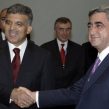
Turkey and Armenia’s Rapprochement Watched Carefully by Azerbaijan
Publication: Eurasia Daily Monitor Volume: 6 Issue: 82
By:

On April 22, the Foreign Ministries of Turkey, Armenia and Switzerland issued a joint announcement saying that Ankara and Yerevan had agreed to work toward improving their relations within the framework of a roadmap under Swiss auspices. United States’ diplomats were also closely involved in the talks which preceded the deal. Although the decision appears as a breakthrough in resolving this long-term dispute, significant obstacles remain before the completion of the rapprochement.
The joint statement read as follows:
"The two parties have achieved tangible progress and mutual understanding in this process and they have agreed on a comprehensive framework for the normalization of their bilateral relations in a mutually satisfactory manner. In this context, a road-map has been identified" (www.mfa.gov.tr, April 22).
Subsequent statements from diplomatic sources clarified that no agreement has been signed and that the parties agreed to continue working toward fully normalizing their bilateral relations. Although the content of the ongoing talks were not disclosed officially, the deal is likely to include establishing diplomatic representations in their respective capitals, gradual re-opening of the border, Armenia’s recognition of Turkey’s international borders, and forming a joint committee of historians to examine the disputed events of 1915 (Sabah, April 24).
Many observers believe that if the process can be concluded successfully, it will not only end the long-standing enmity within the South Caucasus, but it also will redefine the geopolitical map of the region -helping to connect Armenia with Western interests in the region. Therefore, the decision was welcomed by the international community as a constructive step toward reconciliation. A statement from the U.S. State Department commended these efforts and called on the parties to proceed with the talks without any preconditions and within a reasonable time frame.
Initially this was anticipated against the background of the ongoing dialogue, which had accelerated over the past year. This was given a renewed impetus following Turkish President Abdullah Gul’s historic visit to Yerevan in September 2008. In addition to their various bilateral talks, the foreign ministers of both countries also met within the context of multilateral initiatives, raising expectations that a deal could be achieved. Earlier press reports speculated that the two capitals had agreed on a roadmap in late March, but they were debating the proper timing to announce this decision (EDM, March 27; Hurriyet Daily News, March 30). After Obama’s recent high profile trip to Turkey, Turkish-Armenian reconciliation was considered imminent.
However, following Obama’s visit, Ankara stepped back from its commitment to find a solution in an effort to allay concerns in Baku. The Turkish Prime Minister and other officials declared publicly that they would avoid steps which might damage Azerbaijan’s interests, and Turkey would not re-open its border with Armenia unless the latter ended its occupation of Azerbaijani territories (EDM, April 17). These developments rendered an agreement less likely.
The announcement that the parties had held secret talks and committed publicly to a roadmap represented a major breakthrough. Nonetheless, there have been conflicting accounts from each side as to whether concessions were made on preconditions to start the negotiations. The continued mystery surrounding the content of the talks may prove an obstacle to a final settlement. Nationalist forces and the opposition, both within Turkey and Armenia, remain opposed to the way in which the rapprochement is being conducted -in an absence of public scrutiny. Secret diplomacy is the key to achieving a breakthrough in such protracted disputes, and supporters of normalization on both sides insist that the governments should not bow to public pressure to abandon the process (www.ntvmsnbc.com, April 26). Nonetheless, the widening gap between the governments’ rhetoric and reality risks undermining this controversial foreign policy.
The Armenian government came under intense domestic criticism, and a minor coalition partner withdrew from the government. Similar problems within Turkey have further complicated these efforts. The AKP government proceeded with the normalization without first preparing public opinion for such a radical decision. It has also failed to keep the opposition informed. Turkish opposition parties are now calling on the government to stop conducting diplomacy behind closed doors, and inform parliament of the current standing of the talks (Ortadogu, April 28).
Moreover, the Turkish government is criticized for failing to give clear answers as to how the Turkish-Armenian roadmap might impact on Azerbaijan. Apparently, Turkey proceeded with the rapprochement without ensuring Armenia’s response to Azerbaijan’s demands, and this stance contradicted Ankara’s earlier statements that it would protect Baku’s interests. For some Turkish observers, this is an indication that the government did not have a genuine desire for reconciliation with Armenia, but it agreed the roadmap only to remove the word "genocide" from Obama’s April 24 message (Sabah, April 27). For others, Ankara’s zigzagging shows that it is acting opportunistically, which undermines the trust of its partners (Hurriyet Daily News, April 24).
President Gul ruled out any damage to relations with Baku due to the roadmap, and maintained that it will serve the interests of both Baku and Ankara. The Turkish government is attempting to convince Azeri politicians that its efforts toward resolving its problems with Yerevan also promote Azerbaijan’s interests within international forums (Zaman, April 24). Nonetheless, Azerbaijan’s discomfort with these developments is well known.
After noting that he was not in a position to tell Ankara how to handle its relations with Yerevan, Azerbaijan’s President Ilham Aliyev, said during a visit to Brussels, that Baku reserved the right to revise its policies according to the evolving realities in the region. Referring to the conflicting news about the content of the Turkish-Armenian roadmap deal, Aliyev added "The world, the region and the Azeris want to know whether the Karabakh issue was removed from the Turkish-Armenian rapprochement. This is a simple question and has a simple answer" (Cihan Haber Ajansi, April 28).




